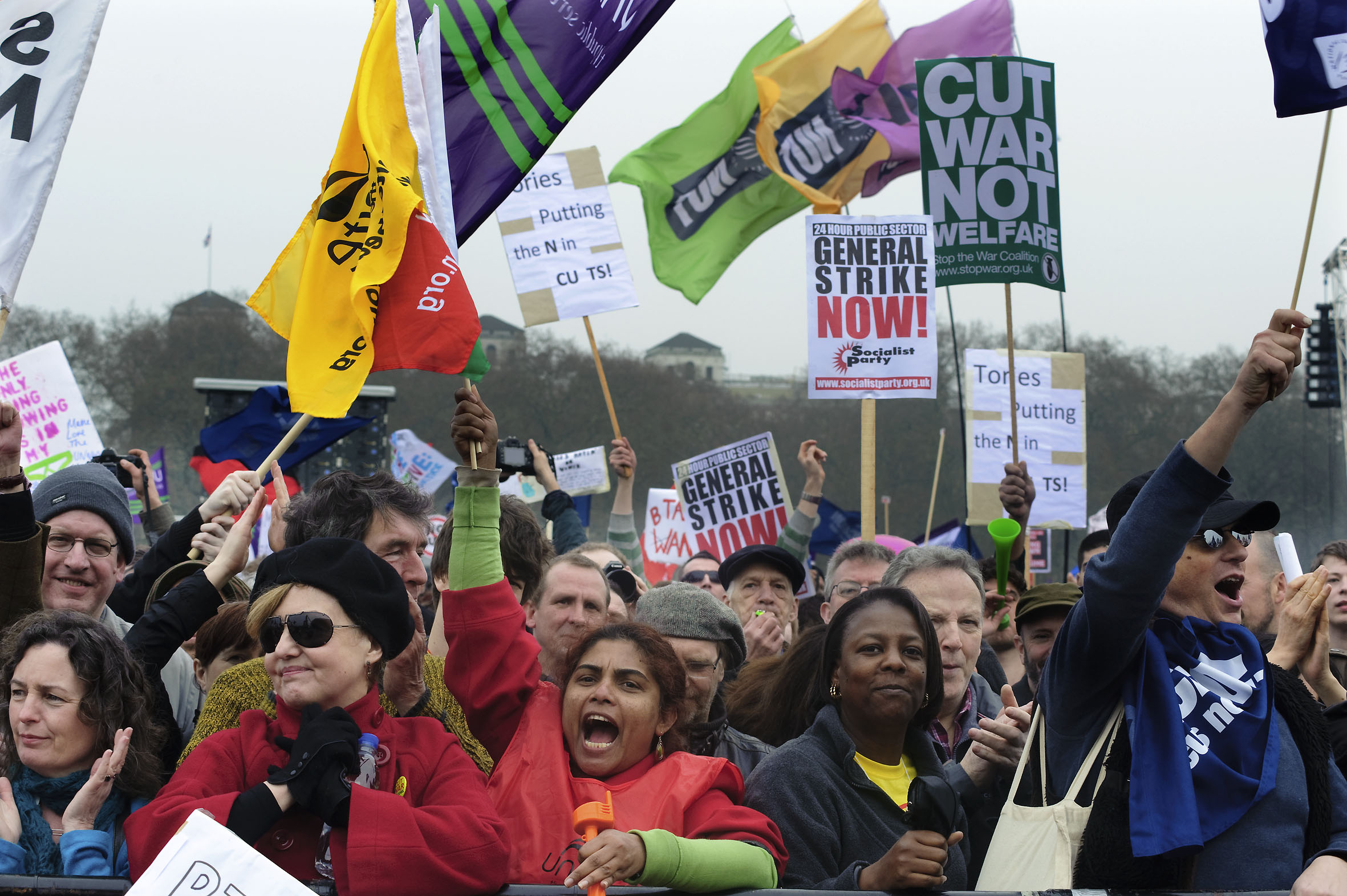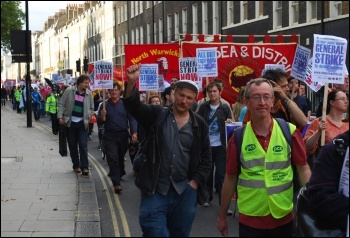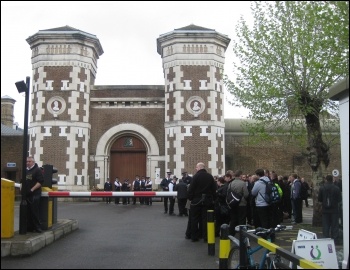Hannah Sell, Socialist Party deputy general secretary
Across the country millions of people are starting to suffer the consequences of Austerity Britain. Over two and a half million are unemployed, with millions only able to get part time work.
Many have suffered pay cuts, with an average pay cut of 10% for the under 30s. Local councils are turning in desperation to charity food banks as central government cuts, implemented at local level, leave growing numbers of people without enough money to buy even basic foodstuffs.
As we predicted all of this misery has not led to a cut in the national debt, but an increase of over £11 billion in the course of the last year as the economy has nose-dived further.
Austerity is hurting but it isn’t working. Yet, unless the working class leads a serious fight to end austerity, the pain we have seen so far will only be the beginning.
According to the Centre for Policy Studies, less than 6% of the government’s cuts programme has so far been carried out. Prime minister Cameron has said that pain and austerity will continue until the end of the decade – another eight years!
Fighting austerity
For the young people who cannot get a job, for the workers thrown on the scrapheap of unemployment, for those suffering benefit cuts, for students and their parents who are having to pay £9,000 a year in fees, for the workers facing a pay freeze, for the communities that are facing cuts and closure to local hospitals, libraries, sports facilities and youth clubs, one question is urgently posed: how can we defend our living conditions and stop austerity?
The struggle to stop austerity began in earnest in 2011. On 26 March we saw the magnificent 750,000-strong trade union demonstration.
This was followed by a number of public sector unions taking coordinated strike action in defence of pensions on 30 June, which in turn created the pressure which led to virtually every public sector union – a massive 30 union-strong coalition – striking together on 30 November 2011 (N30).
This was the biggest single day of strike action in at least 30 years, possibly since the 1926 general strike.
It had massive public support. Even the online poll of the arch right-wing Daily Mail showed 84% of people supporting the strike.
The Daily Mail, in its normal unbiased way, responded by quickly deleting the poll! Instinctively millions of people understood that the strike was on pensions – but it was about more than just pensions.
Union strength
The trade union movement – involving more than six million workers and capable of bringing the country to a halt – represented potentially the most powerful opposition to the government, capable of stopping austerity in its tracks.
We faced a weak government, a coalition fracturing under the impact of events. The Con-Dems are much weaker than Thatcher’s Tory government, and yet she was brought down by the mass movement against the poll tax. Victory for the workers’ movement in 2011 was clearly possible.
Yet that isn’t what happened. On the contrary the government and the capitalists won the first round; forcing through huge cuts in the living standards of millions.
Inevitably this has led to a lowering of the confidence of many workers. Many have also understood that defeat in 2011 was not inevitable, but was a result of the perfidious role of right-wing trade union leaders.
On the very day of the 30 November strike the government announced an extra £30 billion of cuts and threatened an assault on trade union rights, calling the bluff of the trade union leaders.
Tragically, the leadership of the TUC and of Unison, the biggest public sector trade union, responded by immediately retreating.
Although local government workers were offered some concessions on pensions, these were incomparable to what could have been won if the battle had continued.
For workers in other sectors the deal on offer was virtually identical to the insult that had been on the table before N30.
Brendan Barber and the leadership of the TUC, however, have strained every nerve in their efforts to convince workers to accept this rotten deal.
Concession bargaining
In reality, this position was an indication of their faint-hearted belief that the government could not be defeated and that the best that the trade unions could do was act to try to limit the attacks on working class people.
This approach, known as ‘concession bargaining’ – where trade unions agree to give up some of their members’ rights in return for retaining others – never worked.
When, as now, war has been declared on workers’ rights and living conditions it is a disaster. The only way to combat the unprecedented attacks raining down on us is with a strategy of determined mass coordinated action, alongside individual unions vigorously campaigning on the issues that affect them.
Only on this basis can the government be forced to take part in real negotiations. At every stage the trade union movement needs to build for effective action and make it clear that this will be followed up with more if the government does not retreat.
This approach would win the support of workers who are not currently organised in the trade unions, as well as young people, the unemployed, pensioners and so on. Millions would rally to a force capable of defeating austerity.
Letting off steam
At this year’s TUC Congress the National Shop Stewards Network (NSSN) will be organising a lobby to demand such a strategy.
Under pressure the TUC has called a national demonstration on 20 October under the bland heading ‘for a future that works’.
We welcome the demonstration, and will work to make it even bigger than 26 March last year, demanding that the TUC leadership mobilise under a clear slogan like ‘No to austerity’.
It is also crucial that workers can see that – unlike last year – this year’s demonstration is part of a serious strategy to defeat the government rather than just a one off ‘parade’.
The NSSN is demanding that this year’s TUC should discuss urgently setting a date for a 24-hour general strike against austerity to take place. Drawing in private sector workers would really strike a blow against the government.
It is true that levels of unionisation are lower in the private sector than in the public, but the private sector includes the most powerful sections of the organised working class.
Just look at the effect of the tanker drivers discussing the possibility of taking industrial action to get a glimpse of the potential strength of key groups of workers! What is more there is no doubt that, if a clear call for a 24-hour general strike against austerity was made by the leadership of the TUC, it would draw in millions of workers who are not currently trade union members, enormously strengthening the movement.
Significance of general strike
In Britain, unlike many other European countries, there has never been a 24-hour general strike, and the last general strike took place in 1926.
Even a partial 24-hour general strike would electrify the country – giving enormous confidence to the working class.
Particularly if the leadership of the trade union movement stood firm, making it clear that they would call a further 24- or 48-hour general strike if the government did not retreat, even a one-day strike would terrify the government and the capitalists.
The prospect would be raised of the government being forced to call, and then lose, a general election.
Labour has made it clear that they would continue with austerity in government, albeit at a slower pace.
Nonetheless, the working class would be in a far stronger position if the Con-Dems were defeated by a mass movement of the working class.
At the same time, the need to build a mass political voice for the working class is urgently posed by the situation.
There are resolutions on the TUC Congress agenda – from unions with militant, fighting leaderships – that move in the direction of a 24-hour general strike.
The PCS civil service union correctly calls on the General Council to: “prioritise building for the 20 October demonstration – to make it the largest anti-cuts protest in history” and for it to “support coordinated strike action against cuts in pensions, pay and jobs this autumn”.
The POA calls for “taking coordinated action where possible with far reaching campaigning including the consideration and practicalities of a general strike.”
The NSSN lobby will demand support for these motions, or any composite that includes these points.
Undoubtedly the right-wing trade union leaders will raise the problem of Britain’s vicious anti-trade union laws as a reason that a 24-hour general strike is not possible.
These laws, the most repressive in the advanced capitalist countries, were introduced by previous Tory governments and left intact by New Labour.
We do not lightly support breaking the anti-union laws and thereby risking trade union funds, but this struggle is too important to allow individual trade unions to fight alone. Coordinated action is vital, even if it means confronting the anti-union laws.
Role of left unions
The heroic protest action by the POA – which has no legal right to strike – on 10 May this year has not resulted in action been taken against the union because the government is correctly afraid that to do so would create outrage throughout the trade union movement, and result in an escalation of the struggle.
It would be wrong to take a light-minded approach to the anti-trade union laws and the danger of trade unions’ finances – built up by members over decades – being sequestrated by the government.
However, the working class is facing the worst attack on its living conditions and rights to organise in 80 years, and cannot allow the anti-trade union laws to prevent a serious struggle now.
The public sector strike on 30 November indicated how major steps towards a 24-hour general strike could be taken, even within the straitjacket of the anti-trade union laws.
Set a date
If the TUC was to set a date for action all of those unions involved in disputes against different aspects of austerity: from those still fighting on pensions, to Unison threatening action on pay, to the RMT fighting against the consequences of the McNulty report, could coordinate their ballots in order to be able to strike on the day set by the TUC.
Without doubt other groups of workers – alongside students, pensioners and the unemployed – would then also take the decision to join in the action on the date that had been set.
The TUC could make it clear to the government that if any unions or workers were threatened for participating in the strike the TUC would immediately call another 24-hour general strike.
If such a strategy were adopted the anti-trade union laws would be pushed aside, losing their power to hobble the trade union movement.
The NSSN will be vigorously campaigning for such a strategy to be adopted at the TUC congress. However, the events of 2011 demonstrate clearly that it is not sufficient to call on the leadership of the TUC to take action.
In 1972 the TUC did call a 24-hour general strike (knowing that it would not go ahead as the government was about to retreat) but only after the strike had begun to develop from below.
Similarly, the 30 November 2011 public sector strike was only called as a result of the popularity of the strike called by the PCS and NUT, ATL and UCU teaching unions earlier in the year.
The most important task at the TUC congress is for the militant trade unions to discuss how they can again act as a lever to force action.
Left trade unions are already involved in discussing how to coordinate their strike action.
If militant trade unions are able to use the platform of the TUC to make clear that, even if a 24-hour general strike is not called from the Congress, they intend to coordinate a day of strike action between their unions, and call on others to join them; this will raise the hopes of millions.
Activists in other unions would campaign for their union to join the action. This should be combined with mass meetings in workplaces up and down the country calling for a 24-hour general strike.
In this way an unstoppable groundswell towards a 24-hour general strike could be built.
NSSN lobby of the TUC in Brighton
Lobby the TUC to call a 24 hour general strike!
March together against austerity on 20 October – then strike together!
Sunday 9 September 2012 – Assemble 1pm, the Level, Union Road, Brighton BN2 – March at 1.30pm to a rally outside Brighton conference centre – Speakers include:
- Bob Crow, RMT general secretary
- Mark Serwotka, PCS general secretary
For updates and transport info go to: http://shopstewards.net/TUC.lobby.htm Email: [email protected] or call 07952 283 558











